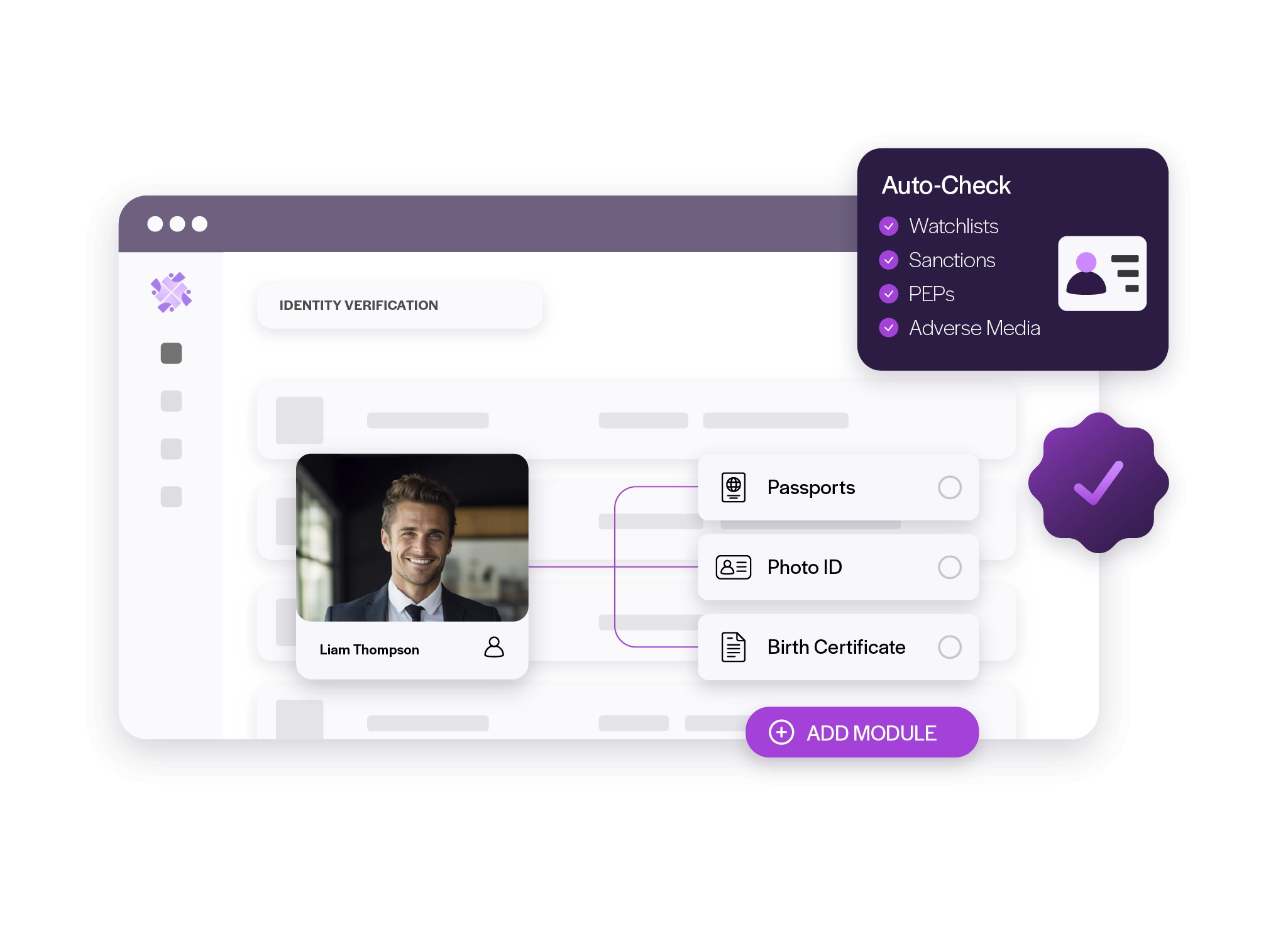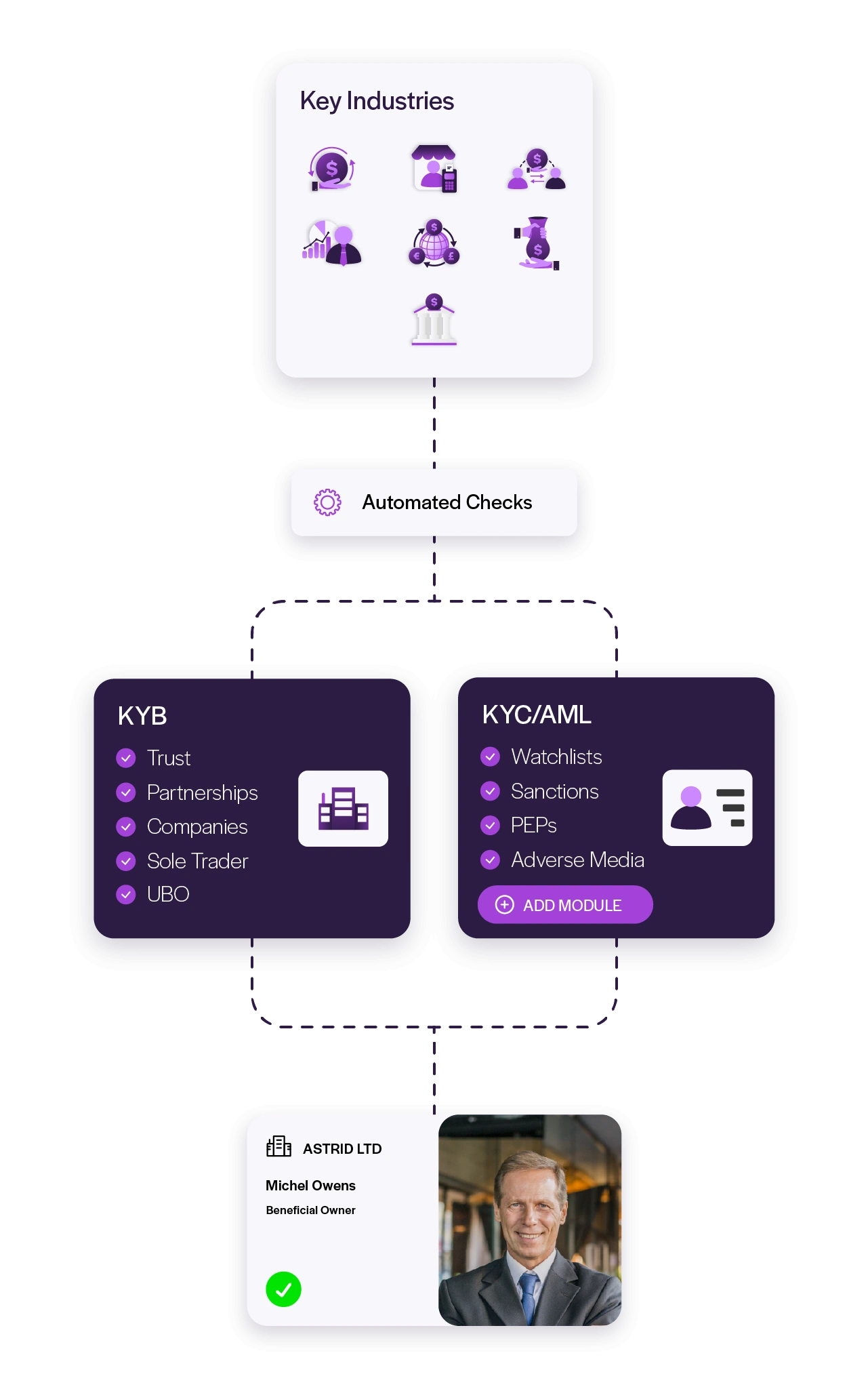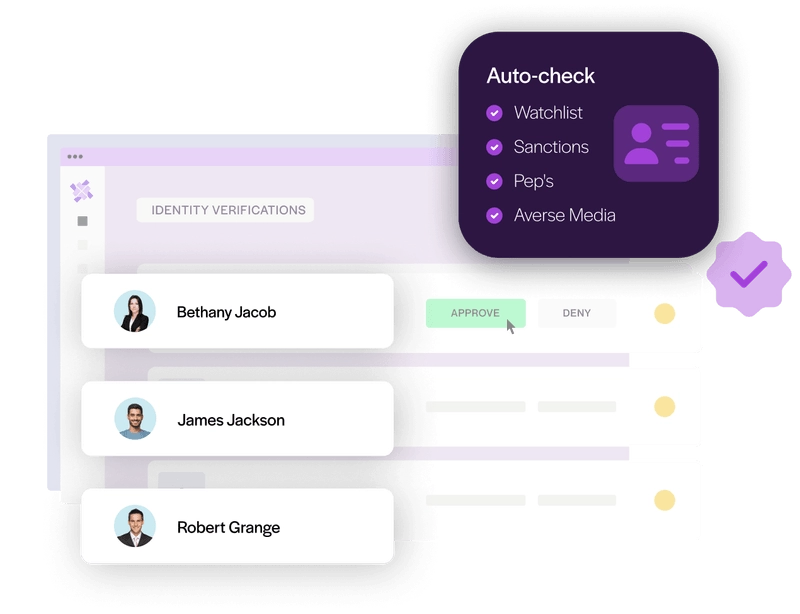A know your customer (KYC) or know your business (KYB) verification API can help financial services and payments companies mitigate operational limits, like:
- Fragmented systems. Multiple databases, online sources, and disconnected APIs increase integration complexity, friction points, and the risk of oversight and errors.
- Manual processing and saving information in a CRM repurposed as a data repository. But this is resource intensive and exposes firms to vulnerabilities, like data breaches, identity theft, and inefficient audit trails.
- Adopting a one-size-fits-all approach for different business entities and regions, leading to false positives and non-compliance.
When we launched our KYC and KYB solution for the financial services industry five years ago, we quickly realized efficient KYC didn't resolve the bigger problem—customer attrition throughout the entire onboarding flow.
So, we designed a customer onboarding solution that removes the friction from every step of the customer boarding process, enabling financial firms to grow their new reseller and merchant base worldwide more efficiently.
As verification experts, we'll share common challenges that make an API a viable solution, what to look for in an API, and how OnBoard helps payment companies and financial services access global KYC APIs through a single solution that resolves customer attrition for the whole registration process.
Key Takeaways
In this article, we'll cover:
- What's really blocking current KYC and KYB checks
- What to look for in a KYC API?
- Why choose OnBoard for a KYC API?
- How a multi-national firm processed 2,000+ KYC and KYB checks worldwide via OnBoard
Looking for an API that can solve KYC challenges? OnBoard can help. Book a demo to see our all-in-one verification platform in action.
What's Really Blocking Current KYC & KYB Checks?
The real challenges to KYC and KYB processes go beyond compliance. They're operational and consist of fragmented systems, manual checks and non-standardized approaches that increase risk and strain onboarding teams.
1. Juggling the Multiple Components Leading to Errors & Oversight
Verifying customer identities involves integrating five to ten different KYC APIs. This fragmentation increases the risk of errors and oversight, undermining compliance and fraud prevention.
KYC APIs range from document verification, address verification, and biometric verifications to anti-money laundering (AML) and politically exposed person (PEP) screenings. But KYB adds multiple steps to identify and verify:
- Business entity
- Ultimate Beneficial Ownership (UBO)
- Tax and VAT verification
- Legal status and licensin
For cross-border operations, this complexity increases to meet regional and local regulations.
The payments and financial services sectors also require deeper integration (often with existing legacy systems) and more maintenance due to frequent compliance changes and software updates, further complicating the onboarding process.
These more intricate integrations demand increased reliance on IT teams to connect disparate APIs. But customer verification teams wind up having to deal with fragmented workflows, with separate solutions for risk, fraud, and regulatory compliance.
2. Manually Verifying New Partners Compromises Audit Trail Quality
We see many businesses outsourcing their KYC and AML verifications because it's so resource intensive. Verification teams must gather customer data and documentation from disparate sources—including taking screen shots of IDs like driver's licenses and passports—analyze them manually, and store them compliantly to be audit ready.
This complexity increases when taking into account countries with regional variations (e.g. Brazil) or where there are limited readily available public databases.
Yet, these manual workflows increase the risk of false positives and human error, which can affect audit trails. Poor audit documentation can lead to increased regulator scrutiny, fines, and closure.
3. Applying One Model Introduces Risk & Aggravate Customers
Another common verification approach we've noticed is multi-industry firms and conglomerates using the same KYC model across all customer segments.
But a one-size-fits-all model doesn't take into account specific risk profiles and regulatory requirements. This results in either unnecessary friction for low-risk customers or insufficient checks for high-risk customers—both of which can lead to compliance failures and customer frustration.
Imagine a acquirer is onboarding two distinct types of merchants: a fashion wholesale marketplace (low risk) and an online gaming platform (high risk). Legally, the fashion marketplace requires basic KYC verifications, but the gambling line demands additional due diligence, including fraud, reputational and credit risk assessments.
To save time, the acquirer uses the same higher-risk workflow for both merchants. But subjecting new fashion partners to the high-intensity verifications that gambling clients go through, could lead to increased friction and drop-offs.
When these merchant types operate across multiple jurisdictions, compliance, fraud, and risk requirements become significantly more complex.
The best practice is to create different verification workflows for each risk profile. But this increases complexity for IT teams. Developers will need to ensure different KYC vendors and APIs work together seamlessly to avoid friction while meeting each profile's unique compliance requirements.
IT teams will also deal with increased workloads to ensure proper maintenance and updates of different KYC flows, inflating overhead costs.
What To Look For In An API For KYC Processes?
Choosing the right KYC API reduces integration complexity and speeds up deployment. It also helps eliminate risks such as data errors, audit gaps, and compliance failures while streamlining your onboarding flow.
- Consolidates services through a unified API. A single API can orhcestrate ultiple KYC workflows designed to cater to different product, risk profiles and jurisdiction. It delivers all essential checks such as AML, PEP screening, biometric verification, and identity authentication. This helps reduce technical complexity, integration costs, and the friction arising from incompatible systems.
- Supports international expansion with global KYC coverage. Global KYC requires an infinite number of screening and verification from multiple databases, to satisfy regulators on an international scale.
- Enables end-to-end automation—from automatic screen captures and analysis to decision making and storage—to reducing operational overheads while dynamically generating audit trails to support compliance processes and oversight.
- Offers flexible workflow customization. A robust solution allows for tailored workflows that can handle geographic nuances, varying risk profiles, and diverse business models, resulting in fewer false positives.
- Scales to meet future demand. Evaluating long-term scalability is essential when choosing a KYC solution. The API should support higher verification volumes and complexity as a customer base expands.
- Delivers a comprehensive onboarding experience. A unified platform that covers every stage of the customer onboarding journey, to create a seamless experience for both customers and internal stakeholders. Risk, fraud, sales and compliance teams can operate within a shared framework, without adding friction or compromising control.
Why Choose OnBoard by MVSI for a KYC API Solution?
OnBoard offers an all-in-one solution that helps sign up new customers, contractors and companies and verifies them against unlimited, fully configurable compliance requirements. These cover all key aspects of KYC, KYB, AML, fraud, and risk, while meeting requirements across credit and privacy regulations.
As an end-to-end platform, OnBoard enables firms to go beyond verifying customers, merchants, and partners to:
- Reduce new customer attrition from sign ups to going live
- Boost sales productivity with automated prospect management and offer generation
- Decrease onboarding costs by reducing the time and resources needed for compliant net new customer acquisition
OnBoard specializes in complete B2B onboarding for payments firms and financial institutions, such as payment facilitators and service providers, banks, and business lenders.
Here's why multi-national firms like Fiserv, ClearAccept, and Xplor count on us to provide them with the global reach and flexibility they need to verify and onboard new partners.
Access A Compliance Orchestration Engine With 100+ Global APIs
Financial firms no longer need to rely on time consuming manual checks or build integrations to different APIs to automate KYC checks. OnBoard is an orchestration engine that consolidates APIs and builds and runs verification flows on auto pilot.
With OnBoard, payment providers have real-time oversight of their business partners, resellers, distributors on a local and global level in 200+ countries and 20+ languages. Over 100 global KYC APIs that connect to over 10,000 data sources (including government databases) worldwide are accessible through OnBoard's single, robust solution. This enables compliant scalability of business across borders without the integration complexity.
OnBoard's API automates global AML and KYC processes by:
- Using a rules-based KYC and KYB engine to assess any business entity or risk profile in every corner of the globe
- Identifying complex legal entities—from trusts to partnerships—with an AI-powered engine
- Delivering out-of-the-box verification for compliance checks, including PEP and AML screenings, as well as sanctions and global watchlists
- Onboarding customers faster and more compliantly with a our real-time individual and organizations verifcations.

OnBoard's fraud, credit-report, and risk database connections fulfill AML and compliance requirements and satisfy risk and fraud teams.
For example, an Australian payment provider needed to increase their onboarding speed to remain competitive. They chose OnBoard's unified solution that enabled same-day onboarding, allowing their customers to take payments in minutes instead of days.
With OnBoard, the payments company reduced drop-offs by 30% and cut the average customer onboarding time from 12 days to the same day.
Customizable KYC Flows for Global Onboarding
Applying the same KYC framework used for an initial product launch may be effective for a payment startup in its early stages. At low volumes, manual processes are manageable across compliance, risk and fraud teams.
But, as the business scales, a one-size-fits-all approach is unsustainable.
Verification volumes quickly outpace existing processes, while legal and compliance requirements grow more complex across jurisdictions. This increases the risk of false positives and regulatory non-compliance.
With OnBoard, financial services and payment firms can configure KYC workflows to meet evolving business needs dynamically.

Organizations can route any application, regardless of customer type or jurisdiction, through OnBoard's end-to-end platform and all via API. Our rules-based engine automatically assesses each one based on an organization's unique configurations.
While no-touch boarding is the goal for every application, the reality is that there are always exceptions. The inbuilt decision engine routes approvals of reviews only to the people or department that needs to see them, greatly reducing workload. This ensures consistent compliance while minimizing false positives, no matter the operating country, risk level, business type, or currency.
OnBoard's subject matter experts offer support in workflow configurations. From identity verification in Germany, FCA regulation in the UK, and FinCEN and the Patriots act in the US, specialized experts assists businesses to configure OnBoard to produce the right outcomes for specific business cases, compliance requirements, and identity checks, no matter the complexity.
"The verification team are great to work with, they understand the time constraint and importance of completing verifications within a strict deadline and communicate effectively. OnBoard solves the entire KYC of all our merchants and does it within a fast timeframe." — Mushayet Chowdhury | PayNuts Risk Manager
OnBoard's high adaptability and specialized support produce proven results:
- 80% reduced in fraudulent applications passing the onboarding process
- 30% increase in sales productivity
- Guaranteed compliance with every regulator, everywhere
For example, a multi-national payment service provider (PSP) turned to OnBoard to build a reseller channel compliantly in a lagging market. In less than two years, they signed up 120+ strategic partnerships, each requiring different verification flows based on their profiles.
Due to OnBoard's customizable platform, the PSP onboarded over 20,000 new merchants through their new partners.
No-Touch Solution Enabling Frictionless Onboarding for Customers
As the global leader of frictionless onboarding, OnBoard doesn't just provide seamless KYC and KYB. It addresses every friction point in the customer sign-up process, enabling businesses to grow more quickly, efficiently and compliantly.
Our end-to-end onboarding coverage includes key sales, fraud and risk operations, enabling a faster transformation of prospects into operational partners and enhancing internal onboarding team alignment.
.webp)
With an all-in-one platform, onboarding teams can:
- Generate offers automatically with pre-built or customized templates and application flows.
- Automate product management. Our engine guides new clients through payment products (e.g., terminals) and services (e.g., processing) while dynamically cueing new data fields and adapting flows based on customers’ selections.
- Digitally sign and generate contracts, in real time, while the merchant is engaged.
- Manage prospects by monitoring real-time progress in prospect offer and application flows, and automate reminder nudges to keep prospects moving forward.
- Handle risk, fraud, underwriting and ongoing continuous due diligence (OCDD) automatically all within the same flow and platform.
OnBoard's dynamic, multi-lingual Smart Forms and AI-powered engine solve end-to-end onboarding friction.
Smart Forms guide prospects through each step, automatically adapting the onboarding flow based on the data provided while collecting documentation and digital signatures for audit trails. These intelligent application forms also detect errors before submission, prompting prospects to correct information or submit new documentation.

OnBoard's AI-powered engine enables no-touch processing, which frees up onboarding teams’ time and reduces overhead costs. The engine automates:
- Documentation gathering
- Customer data analysis
- Pass-or-fail assessments
- Exception analysis
- Workload analysis and task distribution

Organizations can configure exceptions for human reviews and fully white-label the customer applications (including offer generation), to build trust and deliver a seamless onboarding experience . CRMs no longer need to serve as unsecured, high-risk repositories as OnBoard offers a highly secure, cloud-based storage SaaS system as your source of truth, to manage sensitive customer information more safely.
OnBoard also provides an open API for data integration, enabling organizations to automatically export all relevant data (not just KYC) to their preferred database.
Our all-in-one solution supports end-customer and partner verification, accelerating onboarding while reducing the need for human intervention.
How a Multi-National Firm Processes 2,000+ Checks Worldwide via OnBoard
One of our customers is a multi-national software as a service (SaaS) firm that operates under the Dutch regulator. Headquartered in The Netherlands, the SaaS had eight subsidiaries and 20+ brands around the world, each beholding to local regulations.
The customer wanted to launch a new value proposition—their subsidiaries and branches would provide small to medium-sized enterprises (SMEs) embedded payments for their end–customers. But their challenge was multi-fold:
- Ensuring their subsidiaries could reliably comply with their local KYC and AML laws, as they onboarded new SMEs offering payments to end customers for the first time.
- Enabling multi-lingual support for AML screenings and KYC checks in each regional market.
- Providing headquarters with visibility into all their international KYC and KYB checks, ensuring compliance with Dutch authorities.
They approached OnBoard when they realized only a robust yet flexible solution could handle their product launch.
With OnBoard as their all-in-one solution, they were able to:
- Manage and control compliance globally with a single platform.
- Run thousands of KYCs from their central location in the Netherlands
- Access built-in multi-lingual functionality to offer Smart Forms in their subsidiaries’ required languages
- Support KYC and AML compliance in each market
In just 12 months, OnBoard by MVSI helped the customer deliver over 2,000+ KYCs in 6 different languages across 9 countries.
Via a single platform, the SaaS had greater visibility into every offer made under every brand, in every country, while ensuring that KYC and credit risk assessments were completed quickly, with minimal customer impact.
Selecting OnBoard for KYC API and more
OnBoard eliminates the need for multiple APIs, fragmented tools, manual processes, and inflexible, standard KYC models.
Instead, OnBoard delivers a comprehensive onboarding solution that goes beyond KYC integration. Through a single API connection, organizations gain access to 50+ KYC APIs along with an automated platform for compliance, risk, fraud, and sales operations that streamlines every step of the customer onboarding process.
Want an all-in-one solution that solves KYC and KYB needs? Book a demo today.
Frequently Asked Questions
What Is an API in KYC?
An API in KYC (Know Your Customer) enables financial institutions and payment providers to automate and streamline identity verification by connecting to multiple data sources through a single integration. A KYC API consolidates essential checks like AML screening, PEP watchlists, and biometric authentication, reducing manual effort, onboarding delays, and integration complexity. It supports end-to-end merchant onboarding, ensuring global compliance, improving audit trail quality, and decreasing drop-offs. This helps businesses onboard merchants faster and more securely, while maintaining high regulatory standards across jurisdictions.



.png)


